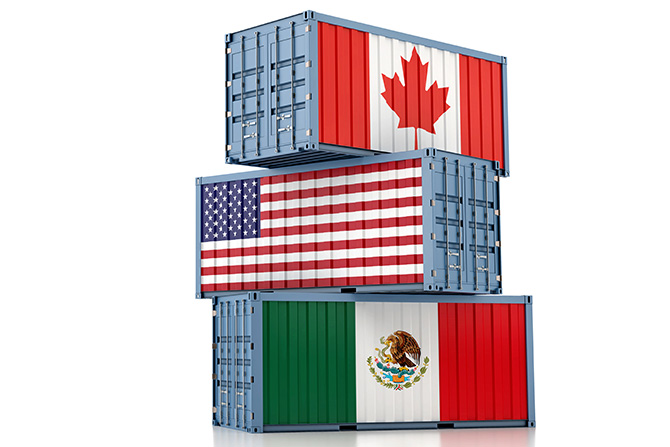A truism in historical, political and media analysis is that our current times are often defined by decisions or factors long in the past that are rarely discussed anymore, and are sometimes even relegated to the dustbin of obscurity. While some current problem rankles our modern society, its root causes can often comfortably exist in relative anonymity in the past, and current pundits are often left to present a kind of context-free, history-free version of events that leaves the reader or viewer in a fog of uncertainty and mystification.
One such example is the North American Free Trade Agreement (NAFTA), which took effect on January 1, 1994. NAFTA isn’t discussed much in current political discourse, but it’s one of the most consequential policy decisions of the past 50 years and is a core component of the modern economy. The trade deal, which received bipartisan support in Congress at the time, was negotiated by President George H.W. Bush with Canada and Mexico from 1990 to 1992, and Bush subsequently signed the deal into law shortly before Bill Clinton’s inauguration in early 1993. NAFTA has since been renegotiated into the similar U.S.-Mexico-Canada (USMCA) trade agreement in 2020, but its legacy and consequences certainly endure.
NAFTA was a controversial issue during the 1992 presidential election, with independent candidate Ross Perot hammering both Bush and Clinton for supporting the deal. Perot said it would lead to a “giant sucking sound” of jobs rushing to Mexico. Perot’s attacks were effective, as he received the highest percentage of votes for an independent candidate in a general election in American history. However, Perot’s attacks primarily stuck to the incumbent Bush, who oversaw the negotiation of the deal, and didn’t have quite the same effect on the younger Clinton, who didn’t have Bush’s extended national track record nor his blue-blood, patrician bearing. Clinton also received notable criticism from the left wing of his own party and trade unions, but seemed largely oblivious to them and sold the legislation with enormous confidence and conviction.
In the early 90s, there was a full-court press by the American media and political class to depict NAFTA as an economic panacea, a deal that would both protect the essential components of the American economy while simultaneously launching the U.S. into an unlimited utopian future. For the most part, NAFTA wasn’t particularly difficult to sell the American public, as it was couched in politically expedient buzzwords such as “growth”, “innovation”, “future” and “opportunity.” Its potentially negative consequences were written off as the concerns of stick-in-the-mud types caught in the past or economically protectionist fringe elements. However, in Mexico, it was quite different. The Zapatista guerrilla army in southern Mexico launched an armed rebellion against the free trade deal, leading to days of fighting with the Mexican government and dozens of deaths.
As an article from the Economic Policy Institute details, “Clinton and his collaborators promised that the deal would bring ‘good-paying American jobs’, a rising trade surplus with Mexico, and a dramatic reduction in illegal immigration. Instead, NAFTA directly cost the United States a net loss of 700,000 jobs. The surplus with Mexico turned into a chronic deficit. And the economic dislocation in Mexico increased the flow of undocumented workers into the United States. Nevertheless, Clinton and his Republican successor, George W. Bush, then used the NAFTA template to design the World Trade Organization, more than a dozen bilateral trade treaties, and the deal that opened the American market to China, which alone has cost the United States another net 2.7 million jobs. The result has been decades of relentless outsourcing of jobs and technology.”
In the past 30 years, in large part due to economic upheaval, demagoguery has become a notable, even defining, feature of American politics. When people are economically precarious, it becomes easier to convince them that scapegoats, no matter how irrational or misplaced the blame, are the cause of intractable systemic problems instead of the actual culprits. NAFTA had dramatic effects not only on the American economy but also on the economies of Mexico and Canada, leading to cascading externalities. This includes immigration, which continues to be a defining issue of American politics. Putting aside the uglier elements of the immigration debate, its salience as an issue has rapidly expanded since NAFTA’s passage, for a few notable reasons. It’s undeniable that immigration has essentially become a political football, used as a stand-in for a myriad of other problems Congress has no desire to address, and, when deployed most cynically as an issue, a tool of demagoguery. NAFTA was a flashpoint for this new reality, and it’s largely straightforward to see why.
A highly detailed article in The American Prospect about NAFTA’s history explains, “Like the other trade agreements of our age, NAFTA is not really about trade. U.S. tariffs on Mexican imports were relatively low before they went into effect. In actuality, the treaty was an agreement to allow market penetration and investment, the relocation of production and the creation of supply chains in manufacturing. Up until the mid-1980s, Mexico had a very protective policy that restricted foreign investment and controlled the exchange rate to encourage domestic growth. A sharp shift in the late 1980s included market opening measures, privatization and economic reforms. These reforms were accelerated by NAFTA’s provisions on foreign investment.”
NAFTA caused a huge influx of capital from the U.S. into Mexico, and vice versa. As the article continues, “NAFTA produced an increase in U.S. investment in auto plants, electronics and garment factories, meatpacking plants and other enterprises. Foreign direct investment rose from $17 billion in 1994 to $104 billion in 2012. U.S. companies, not only in manufacturing, expanded into Mexico generally, using economic reforms and privatization as their wedge. Walmart became Mexico’s largest private-sector employer. Union Pacific and Grupo Mexico bought up the nation’s railroads and ended passenger service, which Union Pacific had long since ended in the U.S. Big Mexican capital also moved into the U.S. A number of these corporations brought with them the anti-worker policies they had honed at home. These changes put Mexican workers increasingly into competition with American and Canadian workers.”
As the article further details, NAFTA super-charged immigration from Mexico to the U.S., for understandable reasons. “At the time of its enactment, some NAFTA champions argued that it would reduce the wage differential between American and Canadian versus Mexican workers. Though the wages of U.S. workers have largely stagnated, that differential has nonetheless grown. NAFTA hurt Mexican wages, rather than reducing the wage differential. In the 20 years after NAFTA went into effect, the buying power of the Mexican minimum wage dropped by 24%. In 2000-01, at the time of the dot-com crash, 400,000 jobs were lost on the U.S./Mexico border, and in the Great Recession of 2008, thousands more were eliminated. With the border so close, many crossed it to survive. NAFTA went far beyond freeing investment; it produced displaced people and swelled an immense wave of migration to the U.S. and Canada. Congress had been warned that NAFTA might increase poverty and fuel migration, but they moved forward with the deal nonetheless.”
The two principal consequences of NAFTA for most everyday people were economic precarity and geographic displacement. In 1990, 4.5 million Mexican migrants were living in the U.S. By 2008, the number reached 12.67 million, roughly 9% of Mexico’s total population. Many of those migrants came after the passage of NAFTA. And because our political leaders refuse to be culpable for the consequences of their decisions, they don’t fess up to the actual reasons behind migration. Instead of leveling with the American people about the consequences of certain policy decisions, most politicians choose to fear-monger, search for convenient scapegoats, mystify the source of the problem, remove historic context from systemic issues, and, in some cases, outright lie. Instead of being honest about the source of increased migration from Mexico, which would be mighty inconvenient for the political class, it’s easier to demagogue, to continually stoke fear and prejudice. Politicians know that an environment of increased economic uncertainty is the perfect one to create fear and to encourage people to lean into their worst impulses. It’s telling that nearly every decision our political leaders make increases economic uncertainty.
One of the primary tools of demagogues is to strip current events of history or context and replace them with their own warped interpretation of reality. In recent decades, Americans have seen a rapid increase in this mode of politics, and policy decisions like NAFTA provide the fuel for this explosive atmosphere. Increased migration from Mexico to the U.S. in recent decades is a perfect example of an issue with material, concrete causes that our political class refuses to explain in direct, honest terms. Instead, we now live in an atmosphere of fear, distrust and paranoia, and the people who have had access to the levers of power in recent decades refuse to take any blame, course correct or be honest about the sources of any of our intractable problems. We have a class of political leaders who have made a series of wildly destructive decisions, and they’ve chosen to double down and head down an extremely dark path. Let’s hope we make it out mostly intact.








